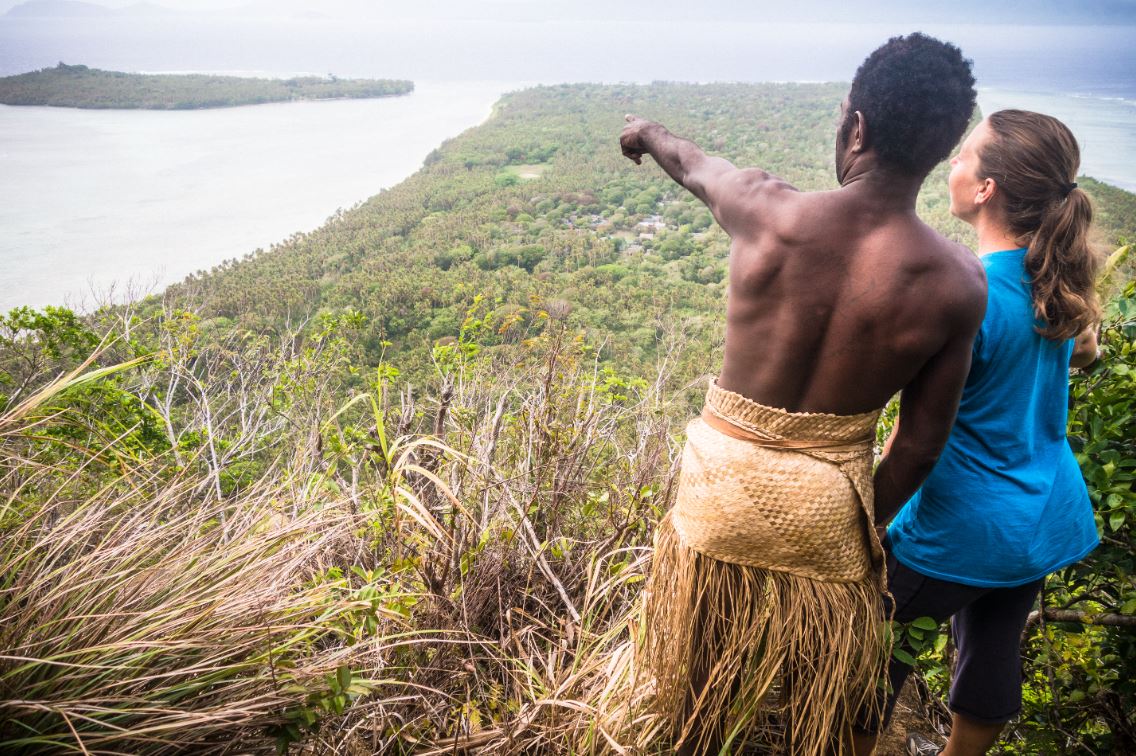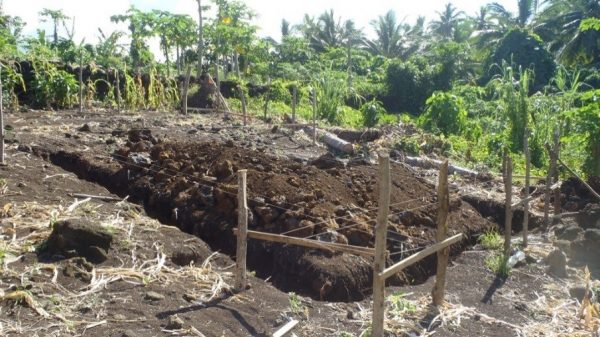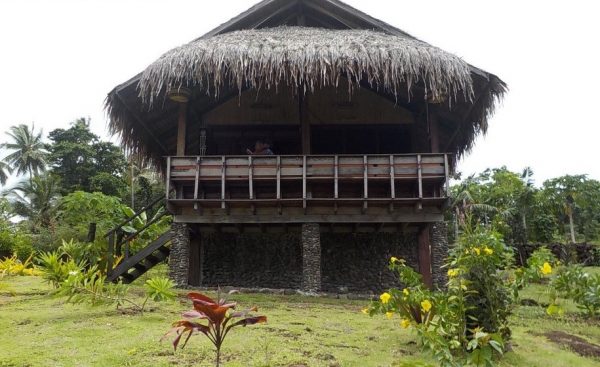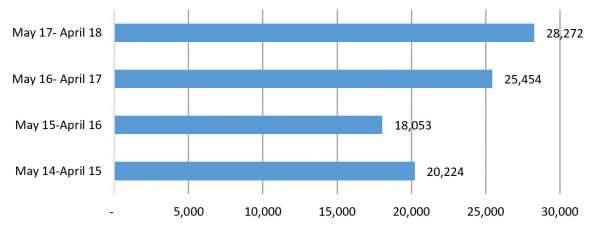
Sleeping Mountain Tour, Motalava, Vanuatu (Credit: David Kirkland Photography)
Getting more tourists to Vanuatu’s outer islands
By Adela Issachar Aru and Warren Gama
5 April 2019
In Vanuatu we have a saying, ‘tourism hemi bisnis blo yumi evriwan’, or ‘tourism is everybody’s business’. This is due to the wide-reaching nature of the tourism sector value chain in Vanuatu. Our communities and businesses, including both direct service providers such as tours and accommodation, and indirect services and complementary businesses such as farmers, taxi drivers and furniture makers, all benefit from tourism. Over 18% of our GDP and 14.4% of formal employment is gained directly from tourism.
Historically, tourism in Vanuatu has been focused on the ‘rest and relaxation’ market – those who stay in larger hotels or resorts and lie by the pool sipping cocktails. However, the 2016 International Visitors’ Survey suggests that there is an opportunity to increase growth in niche markets such as soft adventure, eco-tourism and cultural experiences, which are run by smaller local operators, based mainly in villages and towns in our outer islands.
Last month, our national carrier announced its fleet expansion plans for 2020, with an agreement of four new Airbus A220s. Stronger links to long-haul markets and more regular flights to core markets in our region will provide Vanuatu with greater opportunity to grow our tourism industry. This is a critical driver for inclusive and sustainable development in Vanuatu, as the move to decentralise a portion of our tourism industry will see more direct outcomes for communities that run smaller tourism businesses – on their own terms. This is directly in line with both our customer demand for authentic and unique experiences, and Vanuatu government policy.
A challenge facing this progression is that, unlike Vanuatu’s other productive sectors (such as agriculture or handicrafts), tourism is not a cultural practice for us. While good hospitality is something we have engrained within our society, understanding of the different expectations of international and domestic tourism markets differs dramatically. A lack of comprehension and access to relevant skills and knowledge to address this gap is a major barrier for our outer island destination development and for the sustainable growth of our micro and small local operators.
Collaboratively, the Department of Tourism and the Vanuatu Tourism Office have identified a range of skills and training needs along the growth path of tourism businesses. These include business planning and set-up skills, physical product development areas (such as bungalow design and itinerary development), operational skills (such as book-keeping and marketing), as well as basics such as understanding visitor expectations and customer service.
The Department of Tourism and the Vanuatu Tourism Office have been working closely through a co-investment arrangement with the Australian Government-supported Vanuatu Skills Partnership to ensure access to quality, demand-driven training and business development opportunities for over 140 local tourism businesses and their employees.
While the Department of Tourism and Vanuatu Tourism Office identify emerging businesses, skills gaps and market demands, the Vanuatu Skills Partnership, through the Skills Centres under the Ministry of Education and Training, play the role of a broker, facilitating skills delivery for inclusive local private sector growth.
Through the work of this skills-for-tourism initiative, we have seen higher numbers of quality local businesses become available. In 2018, 63% of the local tourism businesses supported had managed to obtain tourism operator permits, compared with 43% in 2017. Through the initiative, for the first time, a higher quality of locally-operated cruise tours and activity offering has also been noted by travellers, with Mystery Island winning the Top Cruise Destination in the South Pacific category in Cruise Critic’s 2018 Choice Destination Awards. Skills development support has also led to increased representation of locally-owned business finalists at our National Tourism Awards.
An example of this is Chez Maureen Bungalow in Torba province. Through targeted skills development support, the business owner – a local Gaua woman – has been able to grow her business from a dream in 2015 into a thriving business employing three local staff in 2017. The high quality of her accommodation, food and hospitality gained her national recognition in 2018 when she won the Vanuatu Tourism Award – Best Island Style Category.


Through the combined efforts of skills development, destination marketing and market access, Vanuatu has seen more tourists travelling by air to our outer islands in recent years. Available data shows that annual international arrivals who have travelled to outer islands have grown in the past two years, despite the impact of Tropical Cyclone Pam in 2015 and the temporary closure of Bauerfield Airport in 2016.
International arrivals to Vanuatu’s outer islands 2014-2018

Source: Vanuatu National Statistic Office.
We have worked in partnership to support an enabling environment through identification of demand from the local private sector and supply from local training providers and local industry mentors.
This is done through an integrated methodology encompassing five inter-related activities:
- The delivery of blended on-site skills development activities that are contextualised to suit the needs of the small local tourism businesses and entrepreneurs, for example short courses and one-on-one business coaching where required.
- Mainstreaming gender equality, disability inclusion and climate change action through all activity in line with Vanuatu’s National Sustainable Development Plan.
- Support for existing local training providers, provincial governance structures and industry advocacy groups to ensure skills delivery reaches tourism businesses in a locally-led and sustainable way.
- Strengthening market access to provincial travel and booking centres, online travel agents and international wholesalers, as well as links to entrepreneurs in complementary sectors such as handicrafts and agribusiness.
- Collaboration with larger private sector representatives and interested partner donors. (An example of this collaboration in action post-Cyclone Pam can be found here.)
We navigate the diverse interests and agendas of industry partners and stakeholders through ongoing dialogue with local business representatives and partners in addition to a long-term (three to four year) commitment to supporting them and their development aspirations.
In our experience, it is in this way that donors and government departments can be most useful in driving changes that encourage inclusive and sustainable tourism growth. Not by doing, but by bringing together demand and supply and fostering collaboration and coordination between operators, partners and communities.
About the author/s
Adela Issachar Aru
Adela Issachar Aru is the Chief Executive Officer of Vanuatu Tourism Office.
Warren Gama
Warren Gama is the Productive Sector Manager within the Vanuatu Skills Partnership.
